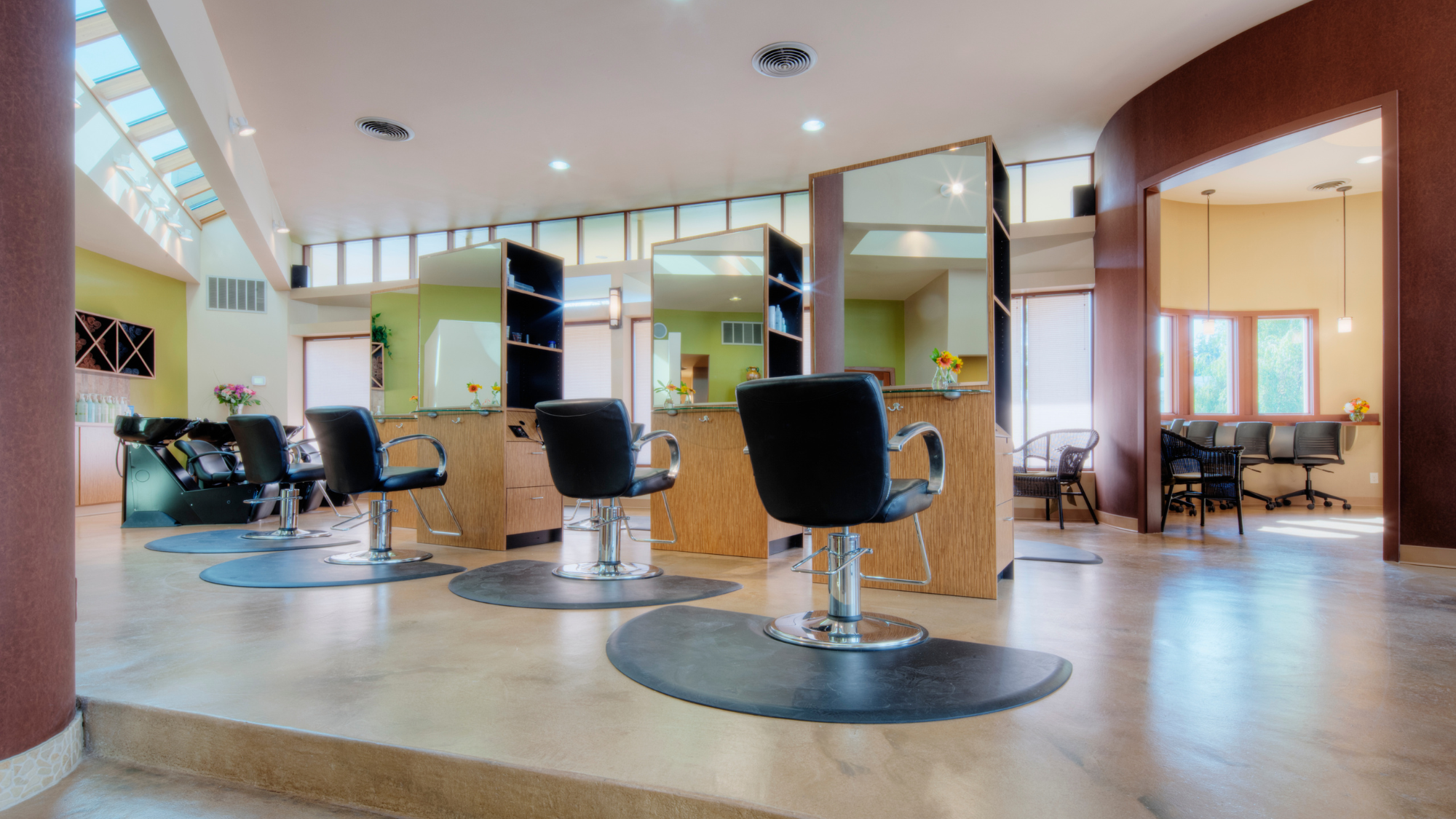Sustainable salons: An expert guide to a more eco-friendly haircut


Sustainability was high on our agenda before the pandemic but over the past two years this evolution has accelerated and we are now looking for more eco-friendly options from the products we use. It doesn't stop there, us beauty lovers are looking for sustainable salons too.
“The British Hairdressing Industry has always been perceived as the best in the world and now has an opportunity to lead the way in sustainability,” says Tabitha James Kraan, environmentalist, who has been pioneering as an organic hairdresser for 24 years and is demonstrating what is possible.
“Becoming more planet-friendly is the key to future growth of salon and hairdressing businesses,” she says. The ones that will thrive over the next few years will be those who are embracing this movement in the fight against climate change: biodiversity loss and long term clean water which are two big elements of this industry are the areas cited by the scientists as potential threats to humanity.
We hosted a panel discussion with the British Beauty Council’s Sustainable Beauty Coalition Hair Taskforce with Tabitha James Kraan, Gina Conway and Anne Veck, as well as Nicola Clarke, celebrity hair colourist (who works with Kate Moss) and Fry Taylor, co-founder of Green Salon Collective.
Becoming a sustainable salon is a journey and this discussion is about empowering salon owners across the UK, as well as us clients, to start somewhere - because by taking one small step forward to change we can make a real difference collectively.
“The hair salon industry produces more carbon emissions than a small country using five million tonnes of plastic every year and 15 litres of water per minute,” says Anne Veck.
Veck recommends watching out for the pollution that we wash down the plughole every day and choosing sustainable and organic products where possible.
Gina Conway who is sustainability consultant to Aveda cites water shortage, conservation and the carbon footprint regarding our waste water as some of the biggest environmental concerns.
Marie Claire Newsletter
Celebrity news, beauty, fashion advice, and fascinating features, delivered straight to your inbox!
Tabitha James Kraan believes that many salons wouldn’t have started their sustainability journey yet: “We’ve just been through a pandemic - so the advice that I would give is to take just one small step. This is a completely non-judgemental area and it’s about coming together and looking at what’s next that matters.”
If you are new to sustainability but know it is kinder to the planet and our future generations and also makes economic sense, starting can be daunting. Nicola Clarke tells us about the hurdles she faces: “Dealing with climate change has definitely been on my radar as there is something we can all do to make a difference but we’re just getting back to business after the pandemic, business rates are going up again, the cost of energy is going up. When it comes to money and cost sustainability gets pushed to the bottom.”
The Leaping Bunny logo has always been important to Clarke, she is recycling at a ground level and has recently joined forces with the Green Salon Collective, a b-corp recycling and education system but believes there is more she wants to do right now like select a team member to become an eco-warrior for her salon.
The Hair Taskforce campaign is addressing the following steps for salons but we can all adopt these tips for more sustainable living:
Sustainable salons are switching to green energy
Join the mass movement away from dirty energy to clean energy. Several providers guarantee 100% green electricity such as Ecotricity, Good Energy and Octopus Energy. Also changing to energy-efficient light bulbs saves energy and reduces bills.
Use biodegradable, compostable towels, gowns and capes
This change will save water, reduce energy use and staff time spent on laundry but they should be made from sustainable materials saving rainforests from destruction. Market leaders are Easydry and Scrummi. Having an individual towel for each client also means improved hygiene, which is crucial in the current climate.
Stock and use eco-friendly products
Move to more sustainable and ethical hair product suppliers. There is an increasing number of well-known brands offering safe, ethical and sustainably-produced products and packaging, free from harsh chemicals. In terms of packaging, there is debate about which materials are the most sustainable – advanced plastics, reclaimed plastics, glass or aluminium.
You also need to think about the cleaning products you're using. Try traditional cleaners like white vinegar and baking soda. If you use cotton towels, wash with eco-friendly products such as Eco Balls. Use a laundry bag when washing microfiber towels and cloths, so you collect the microplastics and prevent them from entering freshwaters and the sea. Sustainable products include those by Bio-D, Mimiml, Ecoleaf. Ecover is your best supermarket choice.
Watch your colour waste
Record how much colour you dispose of daily by collecting it in a bucket. Keep a tally and aim to reduce the amount weekly. Or even better use an app like Vish or PrecisionColour which can help reduce waste and save money.
Avoid flushing colour waste down the drain or sinks as it contains plastic and ends up in our oceans. Also, do not put unsuitable materials such as hair, cotton, plastic, card, paper, metal (foils, colour tubes etc) in the general waste bin or even your recycling bin unless you are certain they will actually be recycled.
For specialist salon recycling try the Green Salon Collective. The organisation put salons through rigorous evaluations and a stringent auditing process. It works hard to advance the understanding the consequences of waste on people and the planet, develop products made from waste materials and enhance services which bring waste materials back into the loop.
Sustainable salons should be accredited
This demonstrates to us clients, employees and the wider industry that a salon goes above and beyond when it comes to looking after both people and planet. Look into Green Salon Collective, Good Salon Guide or the University of Southampton. If you need a hand along the way, download the Salon Resource Tool Kit. Anne Veck and Keith Mellon have compiled an amazing resource that is available on Instagram for free - it is all about actions people can take to make more sustainable salons.
Save water
Instal low flow taps and timer controls to reduce water flow and water saving shower heads like Ecoheads at the backwashes.
Reduce single use plastic
Avoid products containing plastic microbeads and nurdles and choose products with no plastic packaging, for example use soap instead of bottled hand cleanser. Ban single use plastic bottles, serve drinks in glasses not plastic beakers and don't offer plastic bags to clients, encourage them to bring their own bags. If you must have bags, offer biodegradable recycled plastic, paper or reusable canvas.
Phase out card and paper to make your salons more sustainable
Question what you really need: gift vouchers, loyalty cards, appointment cards, price lists even. Do you really need this to be physical? If you have stocks, use them up but don't reprint. If you must, use a water-free and circular economy printer like Seacourt, Jump or Park Lane Press. For in-house printing choose recycled and/or FSC certified paper and card.
Make moves towards becoming carbon neutral
EcoOffset can carbon offset the emissions of a whole team or a single person for a whole year. Prices start at £20 a year.
Spread the word
Tell clients, friends and family to find a way to wash hair less, use a good quality product and less of it and leave in conditioners meaning using less water at home.
Lisa Oxenham is a trailblazing beauty editor, journalist, stylist, and creative director with over 20 years of transformative impact in the beauty industry. As the Beauty and Style Director at Marie Claire UK, she orchestrates high-profile shoots with celebrities and influencers, creating visually stunning and globally resonant content.
A passionate advocate for sustainability, Lisa serves on the Advisory Board for the British Beauty Council's Sustainable Beauty Coalition and the Media Advisory Board. She is also an ambassador for the Soil Association certification and the Amazon Research Institute. Through her "In The Loop" column, she keeps readers informed about the latest advancements in sustainable beauty and supports brands that champion environmental causes, emphasising the need for the beauty industry to reset its priorities.
Lisa's influence extends beyond words; she directs inspiring short films on sustainability and challenges in the beauty industry and is a sought-after public speaker. Recently recognised in the Who’s Who in Natural Beauty 2023, she also champions mental health and eco-conscious practices, demonstrating that glamour and environmental responsibility can coexist beautifully.
-
 Mytheresa is having a secret sale right now and these are the 11 cult items I'm eyeing
Mytheresa is having a secret sale right now and these are the 11 cult items I'm eyeingIncluding the designer bag that was everywhere at Milan Fashion Week
By Clementina Jackson
-
 Prince Harry reportedly extended an 'olive branch' to Kate and William on latest UK trip
Prince Harry reportedly extended an 'olive branch' to Kate and William on latest UK tripBig if true
By Iris Goldsztajn
-
 How Prime Video is protecting Blake Lively amid her new movie promo
How Prime Video is protecting Blake Lively amid her new movie promoAn understandable move
By Iris Goldsztajn